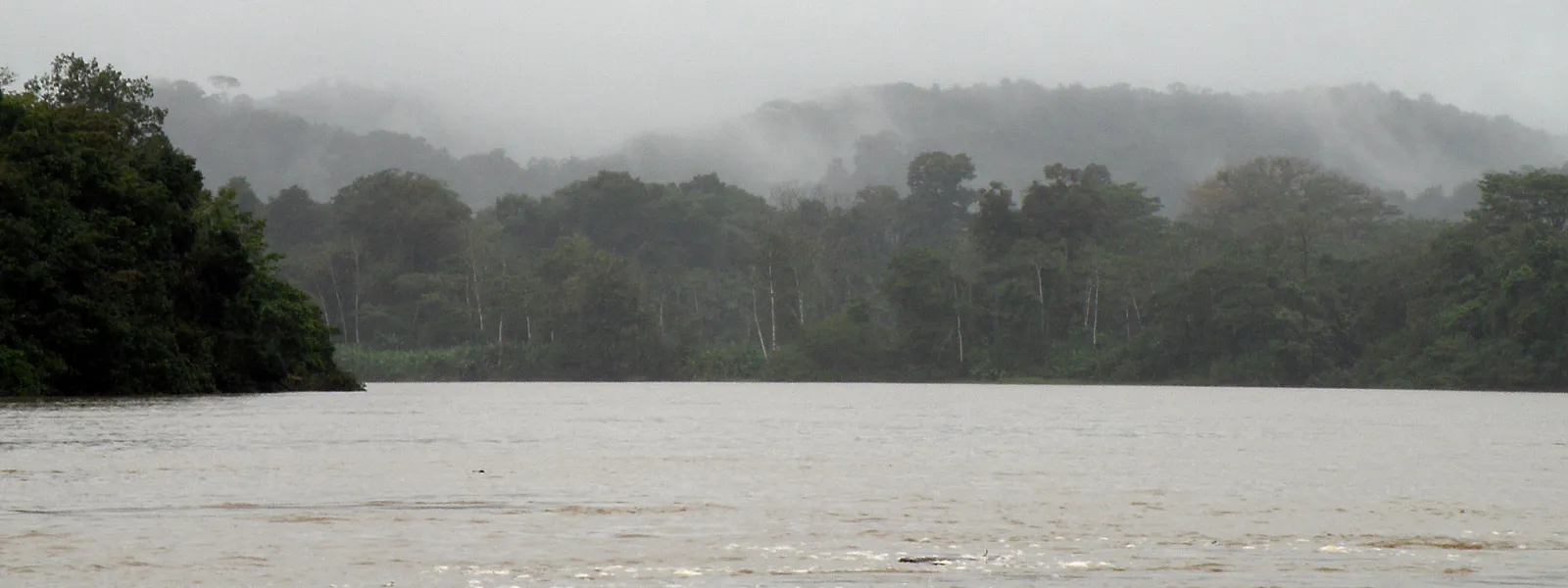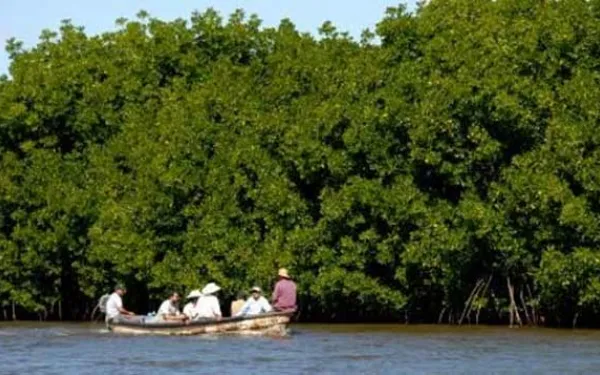
Project
Photo: Thomas Jundt / CC BY-NCVictory: Crucitas gold mine cancelled for environmental harm
In Costa Rica, for the first time, a high-level court cancelled a large-scale mining project for the first time because it violated national laws and threatened the health of the environment. AIDA played an important role in establishing this precedent.
The company, Industrias Infinito, with the support of the previous government, planned to construct an open-pit gold mine in an incredibly biodiverse area near San Juan River, which forms the country’s border with Nicaragua.
The construction and operation of the mine threatened not just the environment but the cultural survival of 32 communities whose way of life depends on tourism and sport fishing in the area.
The fight to stop Crucitas began in 2008 when AIDA warned the Costa Rican government about potential international law violations and environmental impacts that had to be considered before allowing for the project’s implementation. We recommended suspending all work on the project until legal compliance and the protection of the environment and human health were guaranteed.
In November 2010, the Costa Rican Contentious Administrative Court cancelled the project’s concession, reiterating the importance of complying with legal standards when approving projects.
Though the company appealed the ruling, an appeals court later rejected their request and the Crucitas gold mine was cancelled for good.
We congratulate the national NGOs who worked on this case, especially the Environmental and Natural Resources Law Center (CEDARENA), for their tireless efforts in defense of the environment and human rights.
It is our hope that the precedent established in the case will be replicated in nations across Latin America.
Partners:
Related projects
Coral reefs in Latin America: A natural spectacle at risk
Gladys Martínez de Lemos, legal advisor, AIDA Twenty five percent of all marine species have lived at some stage in coral reefs. In Costa Rica, these reefs are under threat from deforestation and other human activities. Coral reefs help maintain balance in the marine environment. They are home to many marine species for human consumption, they protect coasts from erosion and hurricanes, and they offer coastal communities a source of income from diving tourism. But a lack of clear policies and regulations is threatening their survival. These natural wonders help balance the ecosystem by providing a source of food to superior organisms, thus forming vital food webs. Their environmental value is so significant that economists have estimated that a hectare of reef is worth over one million dollars per year. Even though coral reefs cover about a tenth of the ocean floor, current estimates suggest that 25% of all marine species have lived in coral reefs at some stage of their life cycle. Despite this, coral reefs are under threat in Costa Rica and elsewhere from ocean acidification, destructive fishing practices, unsustainable coastal development, and pollution, among other factors. According to the Costa Rica's 15th State of the Nation Report, the loss of 75% of live corals in the Cahuita Reef is mostly due to sedimentation caused by basin deforestation and other human actions. Governmental inaction It's evident that coral reefs are endangered. There are no clear and widespread policies and regulations to deal with this issue; there are no mechanisms for the control, monitoring or even protection to preserve coral reefs. Even current international obligations on coral reef protection are overlooked. This can no longer be. Marine biodiversity and ecosystems must be preserved for future generations to see the beauty and diversity of coral reefs. We all have a son, nephew or cousin who we want to have the opportunity to enjoy the richness of the coral reefs, or the chance to savor fish and their valuable protein. Most Latin American countries and their decision makers have not yet created special laws to protect the coral reefs. They face a huge challenge -- and responsibility -- to protect the reefs.
Read moreCoral reefs in Latin America: A natural spectacle at risk
Gladys Martínez de Lemos, legal advisor, AIDA Twenty five percent of all marine species have lived at some stage in coral reefs. In Costa Rica, these reefs are under threat from deforestation and other human activities. Coral reefs help maintain balance in the marine environment. They are home to many marine species for human consumption, they protect coasts from erosion and hurricanes, and they offer coastal communities a source of income from diving tourism. But a lack of clear policies and regulations is threatening their survival. These natural wonders help balance the ecosystem by providing a source of food to superior organisms, thus forming vital food webs. Their environmental value is so significant that economists have estimated that a hectare of reef is worth over one million dollars per year. Even though coral reefs cover about a tenth of the ocean floor, current estimates suggest that 25% of all marine species have lived in coral reefs at some stage of their life cycle. Despite this, coral reefs are under threat in Costa Rica and elsewhere from ocean acidification, destructive fishing practices, unsustainable coastal development, and pollution, among other factors. According to the Costa Rica's 15th State of the Nation Report, the loss of 75% of live corals in the Cahuita Reef is mostly due to sedimentation caused by basin deforestation and other human actions. Governmental inaction It's evident that coral reefs are endangered. There are no clear and widespread policies and regulations to deal with this issue; there are no mechanisms for the control, monitoring or even protection to preserve coral reefs. Even current international obligations on coral reef protection are overlooked. This can no longer be. Marine biodiversity and ecosystems must be preserved for future generations to see the beauty and diversity of coral reefs. We all have a son, nephew or cousin who we want to have the opportunity to enjoy the richness of the coral reefs, or the chance to savor fish and their valuable protein. Most Latin American countries and their decision makers have not yet created special laws to protect the coral reefs. They face a huge challenge -- and responsibility -- to protect the reefs.
Read more
Protection of Sinaloa’s mangrove swamps put off
By Sandra Moguel, legal advisor, AIDA, @sandra_moguel Marismas Nacionales, the largest wetland in Mexico, is still at risk almost four years since the announcement of a proposed decree to protect it from threats such as major tourist developments. Mexico is the country with the largest number of sites designated as wetlands of international importance in Latin America and yet, surprisingly, these sites have not been looked after. By signing up to the Ramsar Convention[i], the Mexican government made a commitment to draw up plans for, defend and promote the wise useof these ecosystems, as well as to expand its system of protected areas[ii]. Marismas Nacionales is the largest wetland in Mexico, located between the states of Sinaloa and Nayarit. It has been a Ramsar site since 22 June 1995, which means it belongs to the international system for the protection and regulation of wetlands of international importance. The Recommendations of the Ramsar Advisory Mission from 2010 point out that although politically the ecosystem is pided into two different regions, ecologically the two sections of wetland have many things in common and therefore their management should be tackled as a whole. The federal government has already protected the Nayarit portion of the wetland, but four years since the publication of an official Announcement of Decree on the Sinaloa Marismas Nacionales Biosphere Reserve, the procedures for the creation of this Protected Natural Area, which would cover 47,556 hectares of mangrove forest, are yet to be completed. Meanwhile, the construction of massive infrastructure remains a threat to Marismas. The Pacific Coast Integrally Planned Centre – now known as Playa Espíritu (Spirit Beach) – and the Isla de Palma Development are both projects which put this site in jeopardy. The first of these projects has obtained environmental permission to build a 10,000-room resort (although the official proposal involved 44,000 rooms), while the second includes plans to construct accommodation for 200 guests, located in a nuclear zone according to the Sinaloa Marismas Nacionales Biosphere Reserve. The Mexican Secretariat of Environment and Natural Resources (SEMARNAT) justified its authorisation of the Integrally Planned Centre project explaining that the site had not been designated as a Protected Natural Area (or ANP by its Spanish acronym). It is currently studying the environmental impact study on the Isla de Palma development, but it is entirely possible that the argument of the effect it will have on a mangrove area and the habitat of highly migratory birds will not be enough to reject the application for environmental permission. In its Sectoral Program for the Environment and Natural Resources 2007-2012, the federal government promised to increase the total area of land designated as belonging to Protected Natural Areas from 22 million hectares in 2007 to 25.6 million in 2012. But how can this conservation objective be realised if the sites which are expected to be declared Protected Areas at the end of the six-year program have not been “protected”? The declaration of the Sinaloa Marismas Nacionales Biosphere Reserve is not the only decree of its kind to have been delayed: it is much the same story for La Sierra La Laguna and Balandra in Baja California Sur, Santuario Madera in Chihuahua and Ejido el Palmito in Sinaloa, to name but a few. The lack of coordination amongst administrative entities and the disparate organs which make up the environmental sector, combined with insufficient planning instruments such as ANP decrees, prevent decision-making which would favour conservation. Putting off these decrees is unjustifiable regardless of the fact that SEMARNAT’s legal department is swamped with ANP justification studies needing to be examined, or that there may be political reasons for delaying their approval. Issuing a decree on Sinaloa Marismas Nacionales is one way of guaranteeing the constitutional right to a healthy environment, as well as fulfilling international obligations such as Ramsar. It also protects the economic activities of the communities which depend on this ecosystem. [i] Ratified by Mexico on 20 December 1984 and published in the Official Gazette of the Federation on 24 January 1985. [ii] Resolution IX. 22 of the Ramsar Secretariat on wetlands and systems of protected areas, 9th Meeting of the Conference of the Contracting Parties, Uganda, 8-15 November 2005.
Read more